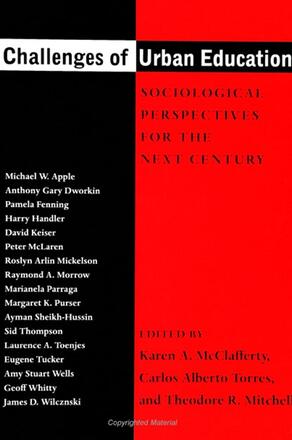
Challenges of Urban Education
Sociological Perspectives for the Next Century
Alternative formats available from:
Presents current research and theoretical perspectives on the challenges facing educators in U. S. urban schools.
Description
A supplemental text with a fresh, bold edge, Challenges of Urban Education includes a range of topics from quantitative analyses of student demographics to the description and analysis of urban high school students' creative writing. The book bridges the dualisms of local and global, theory and practice, and structure and agency. It furthers the advancement of "the new sociology of education" by making connections between the social context of urban schooling and the lives of the individuals who are affected by it.
[Contributors include Michael W. Apple; Anthony Gary Dworkin; Pamela Fenning; harry Handler; David Keiser; Karen A. McClafferty; Peter McLaren; Roslyn Arlin Mickelson; Theodore R. Mitchell; Raymond A. Morrow; Marianela Parraga; Margaret K. Purser; Ayman Sheikh-Hussin; Sid Thompson; Laurence A. Toenjes; Carlos Alberto Torres; Eugene Tucker; Amy Stuart Wells; Geoff Whitty; and Jim Wilczynski. ]
At the University of California, Los Angeles, Graduate School of Education and Information Studies, Karen A. McClafferty is a Doctoral Candidate, Carlos Alberto Torres is Director of the Latin American Center and Professor of Education, and Theodore R. Mitchell is Professor of Education and Vice President for Education and Strategic Initiatives, J. Paul Getty Trust. Carlos Alberto Torres is the author and editor of several books, including, with Theodore R. Mitchell, Sociology of Education: Emerging Perspectives, also published by SUNY Press.
Reviews
"This book is definitely on the cutting edge of educational sociology theory and practice. " — Yali Zou, author of Ethnic Identity and Power: Cultural Contexts of Political Action in School and Society
"This book synthesizes many of the current issues facing urban schools. I was particularly intrigued by the way it shed insight into specific pedagogical approaches that validated the culture of many urban youth by infusing their culture into the curriculum. Such examples of culturally responsive pedagogy are needed to engage urban students in learning. The book illustrates the disconnection that so frequently exists between the lived experiences of urban youth and the school curriculum while simultaneously showing how some teachers have made connections between the two resulting in powerful pedagogy. " — Grace Cureton Stanford, Penn State University